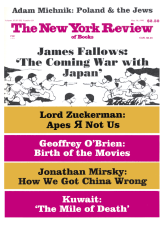In response to:
Metropolitan Opera from the April 25, 1991 issue
To the Editors:
The offense I take at the review in your April 25, 1991 issue of my book, The Conscience of the Eye, is, as in all such cases, of great interest and importance principally to myself. And yet I think the review betrays an attitude toward intellectual labor which merits more general consideration.
May I say first that the form of this review is unacceptable. Robert Adams launches it, only to stop in the middle to call upon his son, Nicholas Adams, whom he says has an expertise which he lacks. If Mr. Adams senior felt unqualified to review the book, why did he undertake it? The review is signed only by the father; this means the son criticizes my book without taking responsibility for what he writes, since his words appear under the name of someone else. The fact that he writes under his father’s name makes matters worse, if anything.
The defects of this review which are of general interest, rather than personally noxious, have to do with a blind spot on the part of both reviewers. My book is a theory about the relation between urban space and urban society. The elder Mr. Adams never mentions that this is my purpose in writing about particular cities, and proceeds in his part of the review as though The Conscience of the Eye were a series of random glimpses of urban scenes past and present. Perhaps abstraction as such leaves him cold and so he leaves it alone, which is certainly his right as a reader. The younger Adams does give a version of my intellectual labor. It is ludicrously simple, but serves a purpose in its very reductio ad absurdum; by “dismantl[ing] the big idea” he can have done with the book. The care he demands of me in the presentation of factual details he does not demand of himself in the exposition of intellectual argument, as though ideas can be stated without accounting their intellectual structure, their references, or the contraries of experience they address. Instead, this intellectual work is conceived as though it were airy “theory,” the enemy of rigorous “fact.”
My reviewers evince a kind of academic anti-intellectualism, an attitude which I think has come to be pervasive in the life of universities in the last twenty years. Long ago Richard Hofstadter wrote a classic study, Anti-Intellectualism in American Life, in which he described the hostility entitled to the life of the mind as deeply rooted in American society. The instabilities of a country in its infancy and adolescence made it fear critical activity which poised at least the risk of delegitimating a fragile national culture. This same fear of institutional fragility has made its appearance from time to time within the American university; one such bout has occurred in the last two decades, when American universities have had to put themselves back together after the traumas of the Sixties. To compensate, American higher education has become highly bureaucratized and professionalized. Intellectual labor, though, unlike office labor, is hard to harness; the mind threatens continually to subvert the materials with which it works. What I mean by the academic anti-intellectualism evinced in the review of my book is a parade of authorities, a refusal to confront intellectual difficulty, a fear of ambiguity, all of which attempt to ward off that power of mind.
It will be said against this that in the last twenty years the humanities have been awash in “theory,” particularly theories imported from France. But the distaste Nicholas Adams has for big ideas has been perfectly mirrored in this act of importation. The works of Foucault, Barthes, Derrida have been reduced by American academics to a set of critical procedures, instruments, and “positions,” which is to take the sting out of these writings, all of which evince a high degree of self-struggle and admission of doubt. Making them into “critical positions,” however, makes them teachable.
Indeed, unmentioned in the Adams family account of my book is my attempt to rescue some of the intellectual value of this older European work from its academic acolytes. My book is largely concerned with modern New York not, as my reviewers have it, because I live there but because New York is a city of heightened economic, ethnic, and racial differences; the city is like a laboratory for the cultural and philosophical ideas of difference which animate the writings of those European writers. I have sought to understand how the physical character of the city is related to the experience of difference.
As it applies to my own book, the review by the Adams family is an irresponsible piece, but in its anti-intellectualism it is very much a piece of our times.
Richard Sennett
New York City
Robert M and Nicholas Adams replies:
Let us assure Professor Sennett that the life of the mind is perfectly safe from us. We criticized a single book, discovering errors that any responsible reviewer would have noted.
This Issue
May 30, 1991



